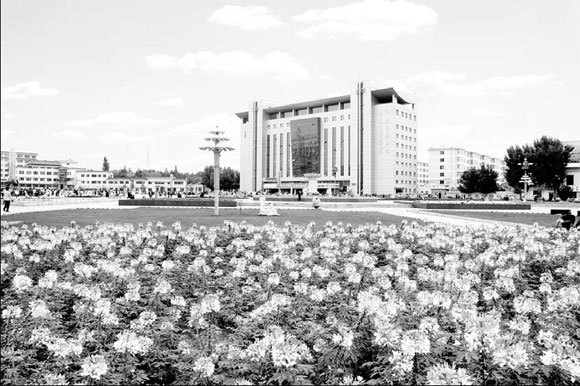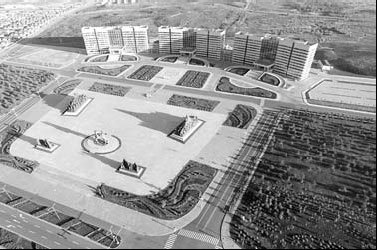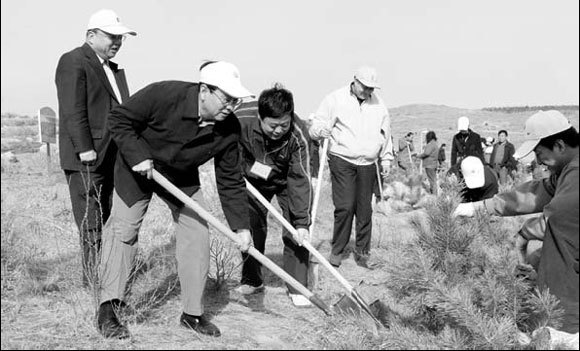The traditional image of Inner Mongolia might be "endless sky with herds of cows and sheep on the wild grasslands," as one of its folk songs goes, but for the city of Ordos the emphasis has turned from the bucolic to the economic.
"As one of the key components of the 'Golden Triangle' and a dynamic economy in the Inner Mongolia autonomous region, Ordos has been intensively developing over the past 10 years through tremendous efforts by the autonomous government and its people," said Du Zi, mayor of the city.

Downtown Ordos: The resource-rich city is showing dynamic growth.
The so-called Golden Triangle consists of three cities in Inner Mongolia - its capital Hohhot, Baotou, known as the steel city, and Ordos. Half of Inner Mongolia's industrial operations are clustered in the triangle.
Du said Ordos' gross domestic product (GDP) totaled 115 billion yuan in 2007, rising 25.8 percent over the previous year and propelling per capita GDP to $10,000. Disposable income of urban residents grew to 16,226 yuan, increasing 24.8 percent over 2006, while per capita income of herders and farmers grew 15.4 percent to 6,123 yuan.
The city's taxes and revenues of about 20 billion yuan in 2007 topped the autonomous region.
According to the National Bureau of Statistics, Ordos ranked 28th among Chinese cities in comprehensive economic strength in 2006.
Continuing efforts
Modern services and manufacturing are emerging as Ordos' pillar industries, Mayor Du said.
Construction of the Dongsheng, Kangbashi and Shenhua industrial parks are part of a new industrial blueprint for the city that emphasizes auto parts manufacturing, car assembly and research and development, he said.
"Technology, human resources and managerial expertise are key contributing factors to the city's flourishing economic growth," he noted.

Ordos municipal government offices
The city has established ties with the Chinese Academy of Sciences, the Chinese Academy of Engineering and a number of universities and research organizations at home and abroad, the mayor added.
"A fairly competitive market also boosts our economic development," he said.
Du boasted of a friendly investment environment and a more efficient and transparent government in Ordos.
Even as the city moves to expand industrial output, environmental issues are a major concern to local authorities.
"Vital to a sustainable development, environmental protection and treatment have constantly been one of the top issues on our governmental agenda," Du stressed.
"In line with the central government's strategy on energy saving and emission reduction, we have been calling on all in society to take responsibility for our shared environment," he said.
"We have ridded ourselves of the past vicious circle - deterioration, treatment, re-deterioration - and now instead encourage new approaches and technologies and the development of eco-friendly, hi-tech and high-value industries that efficiently use energy," he said, adding that regional cooperation plays a key role in environmental protection.
Economic boom
Located in the southwest of Inner Mongolia near the Yellow River, Ordos neighbors the Ningxia Hui autonomous region, Shaanxi and Shanxi provinces, with the Beijing-Tianjin-Tangshan corridor not far distant - all of which endow the city with geographic and economic advantages.
"To strengthen our relations with other regions and further exploit geographic advantages, the Ordos government is committed to infrastructure construction, including expressways, railways, airports and pipelines," Du said.
The government also knows the importance of improving cross-regional cooperation, especially in developing hi-tech for the chemical industry, Du added.
Rich resources
Ordos is rich in a variety of natural resources including coal, natural gas, sodium, gypsum, limestone and silicates. Exploration has shown that the city has more than 50 kinds of mineral deposits.
The city's boundaries hold 124.4 billion tons of proven coal reserves, accounting for about one-sixth of the country's total. Ordos' coal output of 150 million tons in 2005 ranked it among the top producers in the nation.
Proven natural gas reserves in the city account for about one-third of the country's total, with its Suli Gasfield one of the nation's largest.
Even with such vast resources "Ordos is developing a recycling economy and the sustainable use of energy", said Du.
Sustainable systems are under development for coal chemical processing, natural gas, chlorine-alkali chemicals, coal-fired power generation, agriculture, animal husbandry and urban construction, according to the mayor.
Lure of investment
Local authorities have also attached significance to developing industries with a competitive edge through providing efficient administrative services and an improved investment environment, said Du.
"We have launched a number of projects, like developing tourism and building a central business district, a cultural and creative industrial park, and several logistics parks for energy, chemicals and machines," he said.
Construction is now underway on car assembly and auto parts facilities, as well as those for the chemical industry and mining.
"We have also set up centers for modern agriculture and lamp production, both attracting domestic and overseas investors," said Du.
Ordos means "many palaces" in Mongolian - it could come true through the efforts of local government and its people, the mayor said.
Ordos is expected to register a 20 percent increase in GDP, government taxes and revenues, and residents' income every year over the next few years, with a target of $25,000 per capita GDP set for 2012, said Du.

Mayor Du Zi (front, first from left) helps plant trees.
(China Daily March 21, 2008)